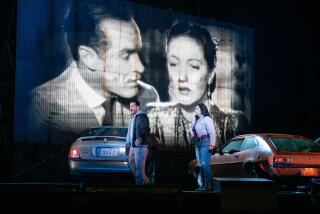Influences: Opera singer Juliana Snapper
- Share via
Los Angeles-based Juliana Snapper is an avant-garde opera singer who aims to take apart opera and the tradition of singing. The Drama Review has said that “Snapper sings the voice as limit ... unbearably raw, a flayed shred of human need, desire, pain.”
She has collaborated with Los Angeles body artist Ron Athey on the work “The Judas Cradle,” which premiered at REDCAT, and performed in (and co-created) the world’s first underwater opera, “You Who Will Emerge From the Flood,” in Manchester, England.
The soprano, who is remarkably good-humored and down to earth in conversation, says she’s tired of what she calls “ill-conceived efforts to make opera ‘friendly,’ or more like movies or musical theater. Why not distill it down and let it do what only opera can do, to let the voice go to work on listening bodies?”
The Oberlin Conservatory- and UC San Diego-educated Snapper is part of REDCAT’s New Original Works Festival 2012, which begins July 25. She’ll sing composer Pauline Oliveros’ “To Valerie Solanas and Marilyn Monroe in Recognition of Their Desperation.” The festival’s first week also includes pieces by Poor Dog Group and Susan Simpson. (The festival runs through Aug. 11.)
We spoke with Snapper about her influences.
Carol Burnett: I watched her show religiously. She had this way — she could just change her face to match whatever voice she was doing. It was this infinitely plastic thing. I think comedy is the only thing harder than singing. People were laughing, but she was also violating things that women were supposed to do. She was getting away with murder.
Nina Hagen: When I was a teenager, I was doing a lot of really intensive training and sneaking out at night to punk shows. That was kind of a bridge for me. Nina Hagen has a really amazing voice and sings with her whole body. I thought there was some natural meeting point between opera and punk. But there’s not: There’s only so much you can do with three chords and a chip on your shoulder.
Barbara Strozzi: She lived in Venice in the 17th century, and she was the protégé of Monteverdi’s protégé. She took a bunch of his ideas as far as they could go — these mad, misshapen, virtuosic cantatas that were almost crushed by their own conventions. When I was in conservatory, to find that there was this singer-composer was inspiring — there was this mean divide between people who write the music and who perform it. I’m thinking about her now, in my frustrations with “friendly” opera or overly “sexy” opera.
George Lewis: He’s a trombonist and improviser, does installations and is also an ethnomusicologist. He says there’s always something at stake in performance. He represents for me a way there can be a productive overlap of critical work and performance — that performance can have a role in that. He offers a way to start having this conversation.
Pauline Oliveros: She was active in the Tape Center in San Francisco. She made her own very sexy intervention into that smug modernism. She’s only now being recognized for it. This turned into something called “Deep Listening,” which has been institutionalized, accepted in New Age circles and tossed out of intellectual circles. But it’s also the most fruitful means to get people to improvise together in a fruitful way.
Juliana Snapper with Opera Povera, New Original Works Festival 2012, at REDCAT, Los Angeles. July 26-28, (213) 237-2800. https://www.redcat.org.
More to Read
The biggest entertainment stories
Get our big stories about Hollywood, film, television, music, arts, culture and more right in your inbox as soon as they publish.
You may occasionally receive promotional content from the Los Angeles Times.










